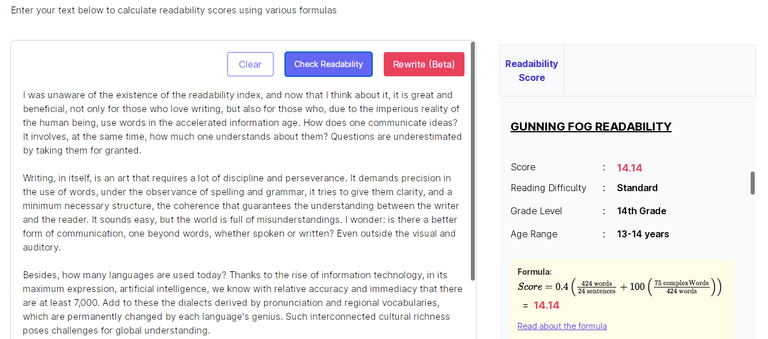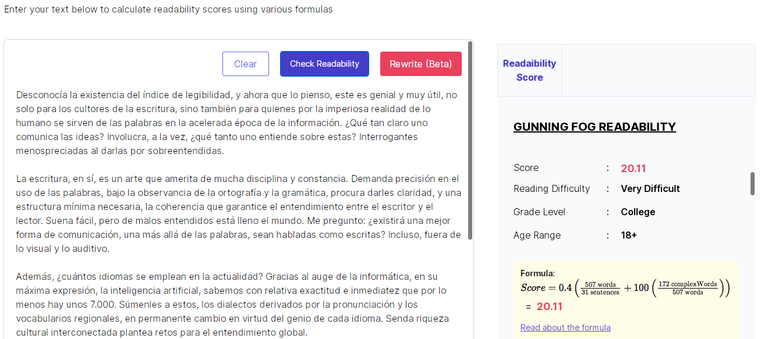Testing the readability of my writing


I was unaware of the existence of the readability index, and now that I think about it, it is great and beneficial, not only for those who love writing, but also for those who, due to the imperious reality of the human being, use words in the accelerated information age. How does one communicate ideas? It involves, at the same time, how much one understands about them? Questions are underestimated by taking them for granted.
Writing, in itself, is an art that requires a lot of discipline and perseverance. It demands precision in the use of words, under the observance of spelling and grammar, it tries to give them clarity, and a minimum necessary structure, the coherence that guarantees the understanding between the writer and the reader. It sounds easy, but the world is full of misunderstandings. I wonder: is there a better form of communication, one beyond words, whether spoken or written? Even outside the visual and auditory.
Besides, how many languages are used today? Thanks to the rise of information technology, in its maximum expression, artificial intelligence, we know with relative accuracy and immediacy that there are at least 7,000. Add to these the dialects derived by pronunciation and regional vocabularies, which are permanently changed by each language's genius. Such interconnected cultural richness poses challenges for global understanding.
How wonderful! In the process, in addition to the language of origin (Spanish) and the shared common language (English), there will also be a supporting and invisible language (machine language based on zeros and ones) and potential target languages (German, Portuguese, Chinese, Danish, Thai, Japanese, Filipino, etc., just to name a few well-known ones).
So, setting out to be understood is an exercise of intelligence. It is not enough to understand oneself, which is difficult to do in internal dialogue. But to make an effort to outline the messages in such a way as to resort to everyday vocabulary, as far as possible, in an attempt to align oneself with ideas and situations that are easy to assimilate. Write to connect with the audience, without using words that are too cultured or vulgar in the extreme. If they have to resort to them, let it be the context that explains them without much effort.
I ask myself, how readable will my words be here and now? Will they be interesting and useful to those who read me, or will they just be a lonely ramble? Any aspiring writer aspires to be read and understood. Although sometimes I am content to read by myself.
Here I leave you, the evaluation of the writing of this post according to Gunning Fog's Readability Index.

Source: Screenshot of readability assessment of this post at www.checkreadability.com

Writing by @janaveda in Spanish and translated to English with www.deepl.com (free version)
The thumbnail was created from Image by Andrys Stienstra on Pixabay
Thanks for reading to me. I hope this writing is to your liking. I would very much like to read your comments and enrich myself with your criticism.
Tired...! Are you no longer satisfied with traditional social networks?
Then I invite you to get to know Hive by clicking here.
Join our global community, where uncensored freedom is our north.



Poniendo a prueba la legibilidad de mi escritura
Desconocía la existencia del índice de legibilidad, y ahora que lo pienso, este es genial y muy útil, no solo para los cultores de la escritura, sino también para quienes por la imperiosa realidad de lo humano se sirven de las palabras en la acelerada época de la información. ¿Qué tan claro uno comunica las ideas? Involucra, a la vez, ¿qué tanto uno entiende sobre estas? Interrogantes menospreciadas al darlas por sobreentendidas.
La escritura, en sí, es un arte que amerita de mucha disciplina y constancia. Demanda precisión en el uso de las palabras, bajo la observancia de la ortografía y la gramática, procura darles claridad, y una estructura mínima necesaria, la coherencia que garantice el entendimiento entre el escritor y el lector. Suena fácil, pero de malos entendidos está lleno el mundo. Me pregunto: ¿existirá una mejor forma de comunicación, una más allá de las palabras, sean habladas como escritas? Incluso, fuera de lo visual y lo auditivo.
Además, ¿cuántos idiomas se emplean en la actualidad? Gracias al auge de la informática, en su máxima expresión, la inteligencia artificial, sabemos con relativa exactitud e inmediatez que por lo menos hay unos 7.000. Súmenles a estos, los dialectos derivados por la pronunciación y los vocabularios regionales, en permanente cambio en virtud del genio de cada idioma. Senda riqueza cultural interconectada plantea retos para el entendimiento global.
Hoy, el inglés es el idioma que tiende puentes. Pero intuyo que asistido en la tecnología emergerá uno que, en el futuro, más pronto que tarde, lo reemplazará. El escribir bien, facilita la traslación de los mensajes. Por ejemplo, este post lo escribo en mi lengua materna, el español. No obstante, lo trasladaré al inglés con las herramientas disponibles en línea, cuidando que exprese con fidelidad mis ideas, para ponerlas a disposición de una audiencia global.
¡Qué maravilla! En el proceso intervendrán, además del idioma de origen (español) y el común compartido (inglés), también un lenguaje de soporte e invisible (de máquina basado en ceros y unos) y los potenciales idiomas de destinos (alemán, portugués, chino, danés, tailandés, japonés, filipinos, etc., solo por nombrar algunos conocidos).
Así que, proponerse ser comprendido, constituye un ejercicio de la inteligencia. No basta, con entenderse a uno mismo, por demás, difícil en el diálogo interno. Si no, esforzarse en esbozar los mensajes, de tal manera de recurrir a vocabularios de usos cotidianos, en lo posible que en un intento que se alinee con ideas y las situaciones de fácil asimilación. Escribir para conectar con la audiencia, sin usar palabras demasiado cultas, ni vulgares en los extremos. Si han de recurrir a ellas, que sea el contexto que las explique sin mucho esfuerzo.
Me pregunto, ¿qué tan legibles serán mis palabras aquí y ahora? ¿Serán interesantes y útiles para quienes me lean? ¿O solo, serán un deambular solitario? Cualquier aspirante a escritor aspira a ser leído y entendido. Aunque a veces yo me conforme con leerme a mí mismo.
Aquí les dejo, la evaluación de la escritura de este post según Índice de legibilidad de Gunning Fog

Fuente: Captura de pantalla de la evaluación de legibilidad de este post en www.checkreadability.com

Un escrito muy personal de @janaveda
Miniatura creada a partir de imagen de Andrys Stienstra en Pixabay
Gracias por leerme. Espero que este escrito sea de su agrado. Me gustaría mucho leer sus comentarios al respecto para enriquecerme con sus críticas.
¡Cansado! ¿Ya no te satisfacen las redes sociales tradicionales?
Entonces, te invito a conocer Hive presionando aquí.
Únete a nuestra comunidad global, en donde la libertad sin censura en nuestro norte.

We appreciate you taking the time, to either use #ThoughtfulDailyPost, or otherwise help this Community grow. So...
Thank you!!
Thanks for your support.
A pollinator from The Pollen Nation feels this post deserves extra attention!
We appreciate your contribution to the blockchain.
For more information or to reach out to us, join our Discord server!
Many thanks to The Pollen Nation and especially to Wesphibin.
I really enjoyed this post. You explained the importance of writing in a way that's easy to understand and relate with. It's true - being understood is not always easy but it matters a lot.
Thank you for your feedback. It's good to know that I'm quite readable and that the ideas connect with someone outside you.
Greetings.